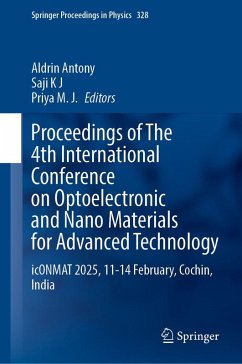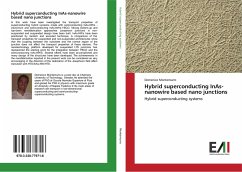
Hybrid-Nanomaterials
Fabrication, Characterization and Applications
Herausgegeben: Gopinath, Subash C. B.; Ramli, Muhammad Mahyiddin

PAYBACK Punkte
49 °P sammeln!
This book highlights the importance of surface nanomaterials for analytical applications and diagnostics. As widely been stated, surface is the base for all downstream analyticalapplications and the incorporation of additional material to form a hybrid makes a drastic improvement in the performance of the surfaces. Even though, metallic hybrid materials play a pivotal role, non-metallic and metallic hybrid materials yield new avenues. Characterization of these hybrid nanomaterials provides a detailed insight, whichattests to new inventions and novel materials. Hybrid nanomaterials are characte...
This book highlights the importance of surface nanomaterials for analytical applications and diagnostics. As widely been stated, surface is the base for all downstream analytical
applications and the incorporation of additional material to form a hybrid makes a drastic improvement in the performance of the surfaces. Even though, metallic hybrid materials play a pivotal role, non-metallic and metallic hybrid materials yield new avenues. Characterization of these hybrid nanomaterials provides a detailed insight, which
attests to new inventions and novel materials. Hybrid nanomaterials are characterized by analytical systems and to generate the analytical systems hybrid materials are essential. The potential of hybrid nanomaterials exists within various interdisciplinary sciences including medicine, which this book presents.
applications and the incorporation of additional material to form a hybrid makes a drastic improvement in the performance of the surfaces. Even though, metallic hybrid materials play a pivotal role, non-metallic and metallic hybrid materials yield new avenues. Characterization of these hybrid nanomaterials provides a detailed insight, which
attests to new inventions and novel materials. Hybrid nanomaterials are characterized by analytical systems and to generate the analytical systems hybrid materials are essential. The potential of hybrid nanomaterials exists within various interdisciplinary sciences including medicine, which this book presents.














